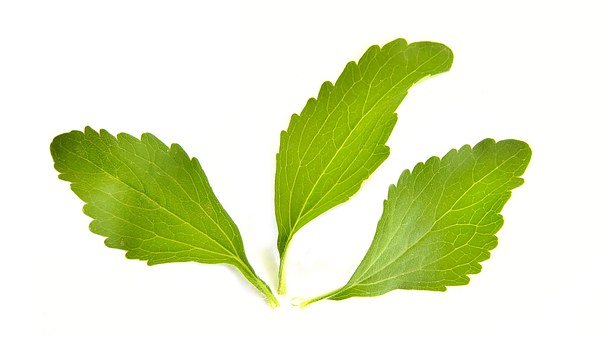The sweetener stevia comes from the leaves of the stevia plant, Stevia rebaudiana. This herbaceous plant originated in the rain forests of Brazil but now grows all over the world. The dried leaves have been used as a sugar substitute for many years. The stevia you purchase in the store is usually cut with another substance, since pure stevia is 100 to 200 times sweeter than sugar. Manufacturers add other ingredients in order to make it easier to measure stevia as you do table sugar. Stevia has fewer side effects than some other artificial sweeteners.
HISTORY OF USE
The United States Food and Drug Administration approved the use of stevia as a sweetener in 2008. Stevia has been used commercially since 1977 in Japan, where it accounts for 40 percent of the artificial sweetener market. The sweetener is also sold in Canada and Australia. A French chemist first isolated the stevia glycoside in 1931. This is the substance which accounts for the herb's sweet taste.
STEVIA AND APPETITE
In the study reported in "Appetite," researchers also looked at the effect of various sweeteners on hunger. They wondered if consuming a particular sweetener would make the person feel hungrier, and if they'd try to make up for missing calories at another meal. People who consumed stevia in the study reported no additional feelings of hunger, and they didn't consume any additional food at a subsequent meal when they were allowed to eat as much as they wanted.
STEVIA AND BLOOD SUGAR
Unlike sugar or honey, stevia does not raise blood sugar, so it is safe for use by diabetics. A study of 21 adults reported in the August issue of "Appetite" found that those who consumed stevia instead of sugar had lower blood glucose levels after meals than study participants who consumed sugar, and lower insulin levels than study participants who consumed sugar or aspartame.
AFTERTASTE
If you use too much stevia, the result is a bitter, slightly metallic aftertaste. Stevia doesn't work well in baked goods, because it doesn't provide the bulk of sugar. Sugar adds texture as well as sweetness to foods. If you bake with stevia, your baked goods may come out flat.

Does stevia have side effects though, other than a slight aftertaste if consumed in large quantities?
Downvoting a post can decrease pending rewards and make it less visible. Common reasons:
Submit
Stevia is good in very small amounts, otherwise it's bitter. Upvoted and PROMOTED!
Downvoting a post can decrease pending rewards and make it less visible. Common reasons:
Submit
Thanks for this great post!
Downvoting a post can decrease pending rewards and make it less visible. Common reasons:
Submit